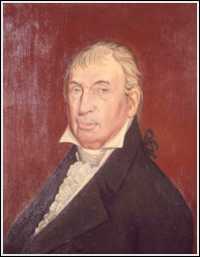FRtR > Biographies >
A Biography of Luther Martin 1748-1826
*** Quote ***
 Like many of the delegates to the Constitutional Convention, Luther Martin attended the College
of New Jersey (later Princeton), from which he graduated with honors in 1766. Though born in
Brunswick, NJ., in 1748, Martin moved to Maryland after receiving his degree and taught there
for 3 years. He then began to study the law and was admitted to the Virginia bar in 1771.
Like many of the delegates to the Constitutional Convention, Luther Martin attended the College
of New Jersey (later Princeton), from which he graduated with honors in 1766. Though born in
Brunswick, NJ., in 1748, Martin moved to Maryland after receiving his degree and taught there
for 3 years. He then began to study the law and was admitted to the Virginia bar in 1771.
Martin was an early advocate of American independence from Great Britain. In the fall of 1774
he served on the patriot committee of Somerset County, and in December he attended a
convention of the Province of Maryland in Annapolis, which had been called to consider the
recommendations of the Continental Congress. Maryland appointed Luther Martin its attorney
general in early 1778. In this capacity, Martin vigorously prosecuted Loyalists, whose numbers
were strong in many areas. Tensions had even led to insurrection and open warfare in some
counties. While still attorney general, Martin joined the Baltimore Light Dragoons. In July 1781
his unit joined Lafayette's forces near Fredericksburg, VA., but Martin was recalled by the
governor to prosecute a treason trial.
Martin married Maria Cresap on Christmas Day 1783. Of their five children, three daughters
lived to adulthood. His postwar law practice grew to become one of the largest and most
successful in the country. In 1785 Martin was elected to the Continental Congress, but this
appointment was purely honorary. His numerous public and private duties prevented him from
traveling to Philadelphia.
At the Constitutional Convention Martin opposed the idea of a strong central government. When
he arrived on June 9, 1787, he expressed suspicion of the secrecy rule imposed on the
proceedings. He consistently sided with the small states and voted against the Virginia Plan. On
June 27 Martin spoke for more than 3 hours in opposition to the Virginia Plan's proposal for
proportionate representation in both houses of the legislature. Martin served on the committee
formed to seek a compromise on representation, where he supported the case for equal numbers
of delegates in at least one house. Before the convention closed, he and another Maryland
delegate, John Francis Mercer, walked out.
In an address to the Maryland House of Delegates in 1787 and in numerous newspaper articles,
Martin
attacked the proposed new form of government and continued to fight ratification of the
Constitution through 1788. He lamented the ascension of the national government over the states
and condemned what he saw as unequal representation in Congress. Martin opposed including
slaves in determining representation and believed that the absence of a jury in the Supreme Court
gravely endangered freedom. At the convention, Martin complained, the aggrandizement of
particular states and individuals often had been pursued more avidly than the welfare of the
country. The assumption of the term "federal" by those who favored a national government also
irritated Martin. Around 1791, however, Martin turned to the Federalist party because of his
animosity toward Thomas Jefferson.
The first years of the 1800s saw Martin as defense counsel in two controversial national cases. In
the first Martin won an acquittal for his close friend, Supreme Court Justice Samuel Chase, in his
impeachment trial in 1805. Two years later Martin was one of Aaron Burr's defense lawyers
when Burr stood trial for treason in 1807.
After a record 28 consecutive years as state attorney general, Luther Martin resigned in December
1805. In 1813 Martin became chief judge of the court of oyer and terminer for the City and
County of Baltimore. He was reappointed attorney general of Maryland in 1818, and in 1819 he
argued Maryland's position in the landmark Supreme Court case McCulloch v.
Maryland. The plaintiff, represented by Daniel Webster, William Pinckney, and
William Wirt, won the decision, which determined that states could not tax federal
institutions.
Martin's fortunes declined dramatically in his last years. Heavy drinking, illness, and poverty all
took their toll. Paralysis, which had struck in 1819, forced him to retire as Maryland's attorney
general in 1822. In 1826, at the age of 78, Luther Martin died in Aaron Burr's home in New
York City and was buried in an unmarked grave in St. John's churchyard.
 Like many of the delegates to the Constitutional Convention, Luther Martin attended the College
of New Jersey (later Princeton), from which he graduated with honors in 1766. Though born in
Brunswick, NJ., in 1748, Martin moved to Maryland after receiving his degree and taught there
for 3 years. He then began to study the law and was admitted to the Virginia bar in 1771.
Like many of the delegates to the Constitutional Convention, Luther Martin attended the College
of New Jersey (later Princeton), from which he graduated with honors in 1766. Though born in
Brunswick, NJ., in 1748, Martin moved to Maryland after receiving his degree and taught there
for 3 years. He then began to study the law and was admitted to the Virginia bar in 1771.